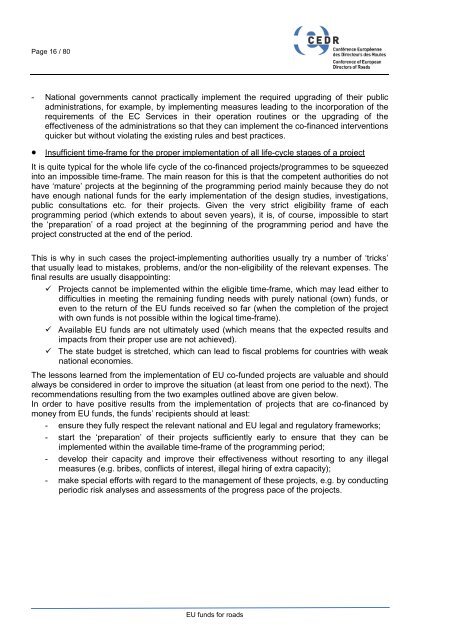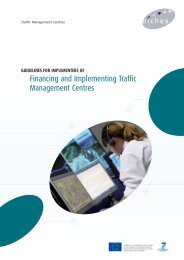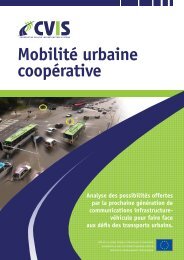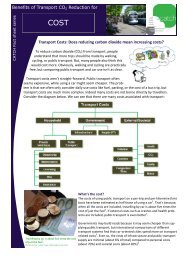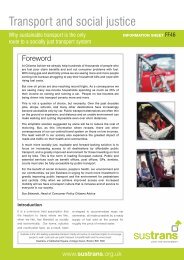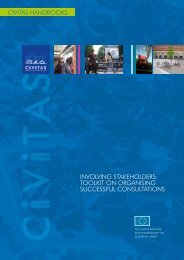EU funds for roads - CEDR
EU funds for roads - CEDR
EU funds for roads - CEDR
You also want an ePaper? Increase the reach of your titles
YUMPU automatically turns print PDFs into web optimized ePapers that Google loves.
Page 16 / 80<br />
- National governments cannot practically implement the required upgrading of their public<br />
administrations, <strong>for</strong> example, by implementing measures leading to the incorporation of the<br />
requirements of the EC Services in their operation routines or the upgrading of the<br />
effectiveness of the administrations so that they can implement the co-financed interventions<br />
quicker but without violating the existing rules and best practices.<br />
• Insufficient time-frame <strong>for</strong> the proper implementation of all life-cycle stages of a project<br />
It is quite typical <strong>for</strong> the whole life cycle of the co-financed projects/programmes to be squeezed<br />
into an impossible time-frame. The main reason <strong>for</strong> this is that the competent authorities do not<br />
have ‘mature’ projects at the beginning of the programming period mainly because they do not<br />
have enough national <strong>funds</strong> <strong>for</strong> the early implementation of the design studies, investigations,<br />
public consultations etc. <strong>for</strong> their projects. Given the very strict eligibility frame of each<br />
programming period (which extends to about seven years), it is, of course, impossible to start<br />
the ‘preparation’ of a road project at the beginning of the programming period and have the<br />
project constructed at the end of the period.<br />
This is why in such cases the project-implementing authorities usually try a number of ‘tricks’<br />
that usually lead to mistakes, problems, and/or the non-eligibility of the relevant expenses. The<br />
final results are usually disappointing:<br />
Projects cannot be implemented within the eligible time-frame, which may lead either to<br />
difficulties in meeting the remaining funding needs with purely national (own) <strong>funds</strong>, or<br />
even to the return of the <strong>EU</strong> <strong>funds</strong> received so far (when the completion of the project<br />
with own <strong>funds</strong> is not possible within the logical time-frame).<br />
Available <strong>EU</strong> <strong>funds</strong> are not ultimately used (which means that the expected results and<br />
impacts from their proper use are not achieved).<br />
The state budget is stretched, which can lead to fiscal problems <strong>for</strong> countries with weak<br />
national economies.<br />
The lessons learned from the implementation of <strong>EU</strong> co-funded projects are valuable and should<br />
always be considered in order to improve the situation (at least from one period to the next). The<br />
recommendations resulting from the two examples outlined above are given below.<br />
In order to have positive results from the implementation of projects that are co-financed by<br />
money from <strong>EU</strong> <strong>funds</strong>, the <strong>funds</strong>’ recipients should at least:<br />
- ensure they fully respect the relevant national and <strong>EU</strong> legal and regulatory frameworks;<br />
- start the ‘preparation’ of their projects sufficiently early to ensure that they can be<br />
implemented within the available time-frame of the programming period;<br />
- develop their capacity and improve their effectiveness without resorting to any illegal<br />
measures (e.g. bribes, conflicts of interest, illegal hiring of extra capacity);<br />
- make special ef<strong>for</strong>ts with regard to the management of these projects, e.g. by conducting<br />
periodic risk analyses and assessments of the progress pace of the projects.<br />
<strong>EU</strong> <strong>funds</strong> <strong>for</strong> <strong>roads</strong>


